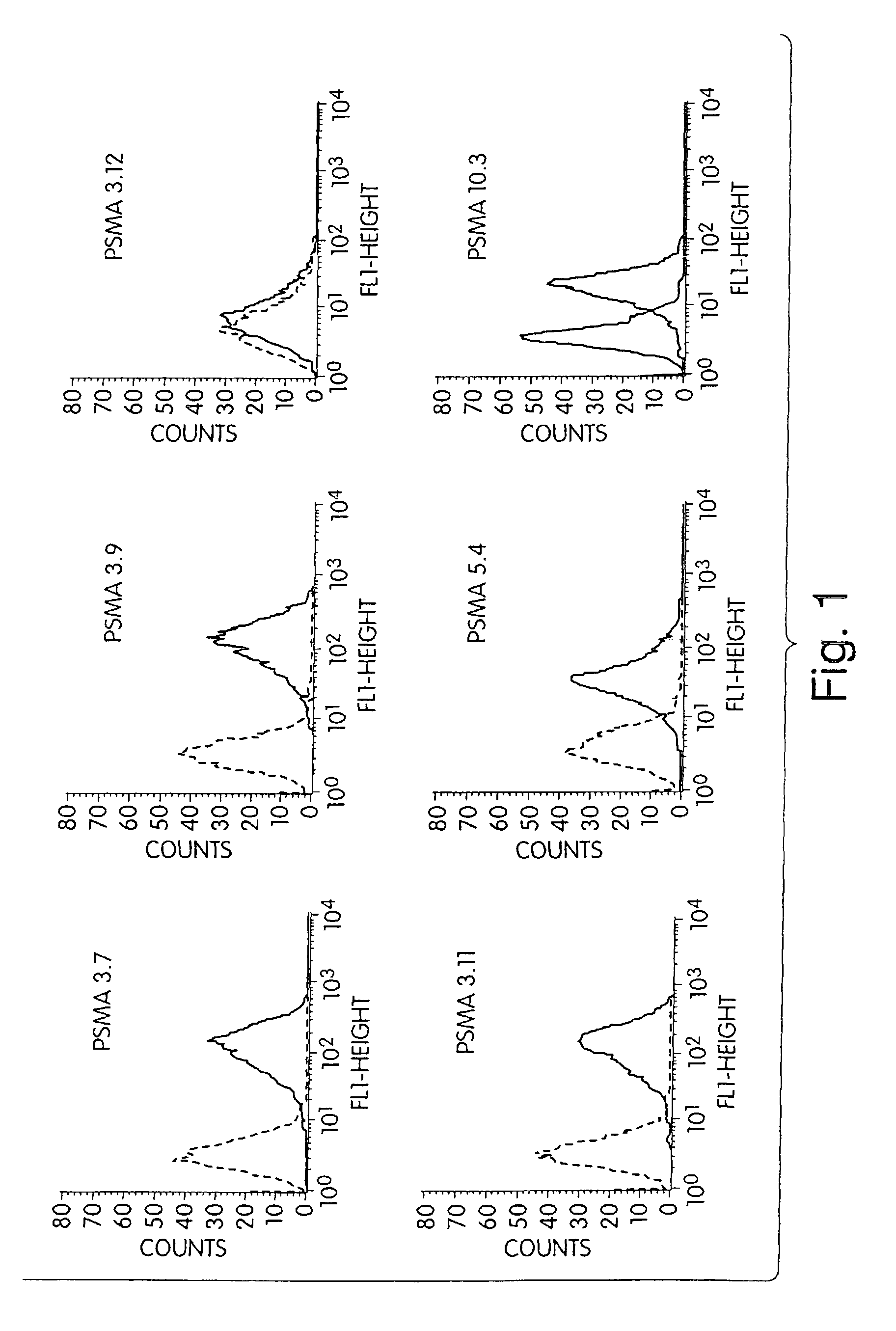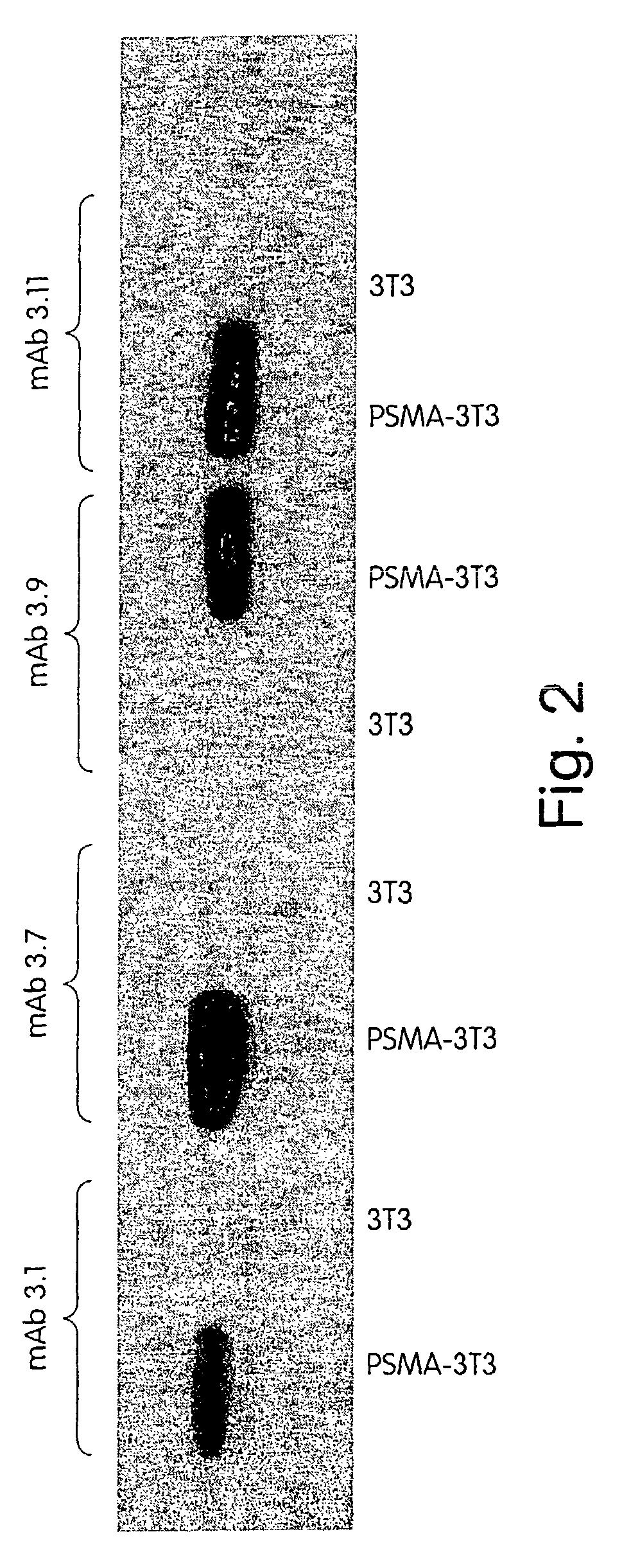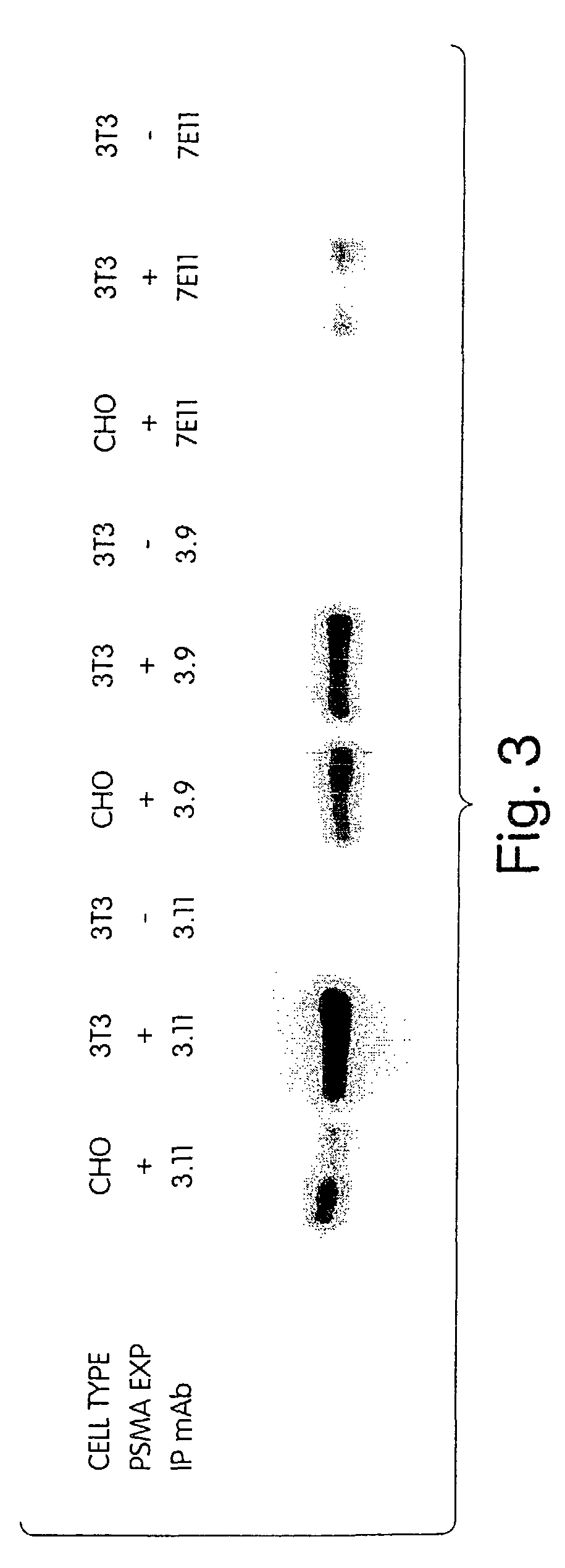PSMA antibodies and protein multimers
a technology of protein multimers and psma antibodies, which is applied in the direction of depsipeptides, peptide/protein ingredients, fungi, etc., can solve the problems of increasing health care expenditure, affecting the treatment effect, so as to achieve the effect of assessing the effectiveness of a treatmen
- Summary
- Abstract
- Description
- Claims
- Application Information
AI Technical Summary
Benefits of technology
Problems solved by technology
Method used
Image
Examples
example 1
Generation of a Panel of Monoclonal Antibodies (mAbs) to Conformational Epitopes on PSMA
[0268]A panel of anti-PSMA mAbs that represent promising candidates for therapy was created. Briefly, the mAbs were generated as follows: BALB / c mice were immunized subcutaneously with recombinant PSMA at approximately three-week intervals. After a total of 4 injections, mice were sacrificed and their splenocytes fused with a myeloma cell line using standard techniques in order to create hybridomas. Individual hybridoma supernatants were screened by ELISA for reactivity with PSMA derived from either LNCaP human prostate tumor cells or from 3T3 cells engineered to express full-length human PSMA (3T3-PSMA cells). Positive clones were secondarily screened by flow cytometry for specific reactivity with intact 3T3-PSMA and LNCaP cells so as to select antibodies that recognize native, cell-surface PSMA and thus have the greatest therapeutic potential.
[0269]Mice having the ability to produce human antib...
example 2
Production of Anti-PSMA mAbs
[0276]To accurately and quantitatively assess the therapeutic potential of these mAbs, the mAbs are produced in a quantity and quality suitable for extensive in vitro and in vivo characterization. Briefly, the mAb-secreting hybridomas are cultured in roller bottles in DMEM / F12 medium supplemented with 10% FBS that has been depleted of bovine IgG (Life Technologies). During the production phase of the culture, cells are maintained at ˜5×106 cells / mL via twice-weekly exchanges of media. Collected media are clarified by filtration through a 0.22 micron filter and stored at −95° C. prior to purification. Given an average antibody expression levels of ˜25 mg / L, approximately 3L of roller bottle supernatants are required for each antibody to allow for losses in purification.
[0277]Culture supernatants from a given hybridoma are pooled and loaded onto a Protein A SEPHAROSE affinity column. Mouse IgG2a, mouse IgG2b and human IgG1 antibodies are loaded directly, bu...
example 3
Evaluation of the Therapeutic Potential of the Unlabeled mAbs In Vitro
[0278]Purified mAbs are tested in a battery of assays for therapeutically relevant properties, including affinity, specificity, enzyme inhibitory activity and effector functions. The ideal product candidate binds and inhibits PSMA activity at subnanomolar concentrations and mediates potent cell-killing through Fc-related effector functions.
[0279]First, the mAbs' affinity for cell-surface and secreted forms of PSMA is measured by flow cytometry and ELISA, respectively. In the flow cytometry assay, varying amounts of mAbs are incubated with 5×105 3T3-PSMA cells in FACS buffer (PBS containing 1% FBS and 0.1% NaN3) for 2 hr to allow for saturation binding. Cells are washed and incubated with a phycoerythrin-coupled goat antibody to mouse IgG (ICN / Cappel) for detection of bound mAb by flow cytometry. Specific binding is calculated by subtracting the fluorescence intensity observed with parental 3T3 cells.
[0280]For ELIS...
PUM
| Property | Measurement | Unit |
|---|---|---|
| temperatures | aaaaa | aaaaa |
| concentration | aaaaa | aaaaa |
| concentration | aaaaa | aaaaa |
Abstract
Description
Claims
Application Information
 Login to View More
Login to View More - R&D
- Intellectual Property
- Life Sciences
- Materials
- Tech Scout
- Unparalleled Data Quality
- Higher Quality Content
- 60% Fewer Hallucinations
Browse by: Latest US Patents, China's latest patents, Technical Efficacy Thesaurus, Application Domain, Technology Topic, Popular Technical Reports.
© 2025 PatSnap. All rights reserved.Legal|Privacy policy|Modern Slavery Act Transparency Statement|Sitemap|About US| Contact US: help@patsnap.com



